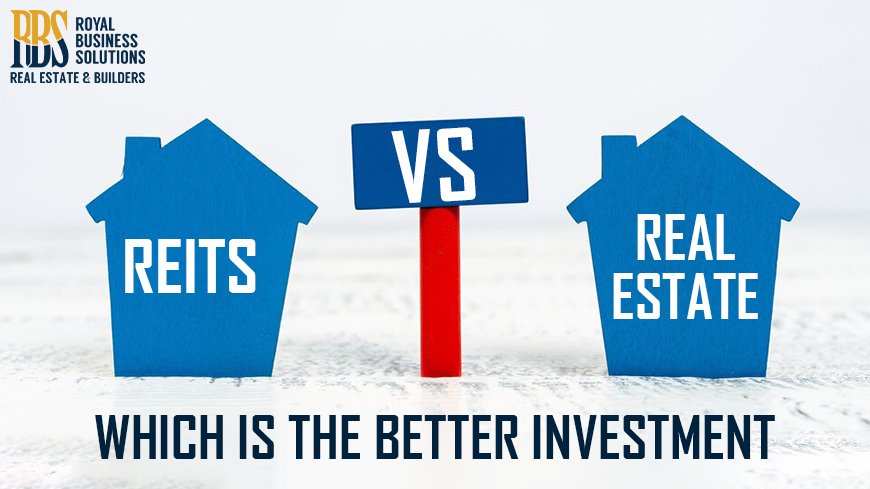- October 31, 2023
- Posted by: Muhammad Shehzad
- Category: Blogs

Introduction
Investing in real estate has long been a popular choice for those looking to build wealth and generate passive income. However, in recent years, Real Estate Investment Trusts (REITs) have become a new competitor. REITs vs Real Estate, both options offer distinct advantages and disadvantages, and deciding which is the better investment depends on your financial goals, risk tolerance, and investment strategy.
In this blog, we’ll discuss the pros and cons of each investment option to help you determine which is the better choice for your financial goals.
Difference Between REITs and Real Estate
The difference between REITs and Real Estate is difficult to consider and choosing the best. In order to select the best one for REITs vs Real Estate we have to understand separately these terms first.
REITs
Real Estate Investment Trusts (REITs) offer a different way to invest in real estate. They are firms engaged in owning, managing, or funding income-generating real estate. Further, they collect funds from investors and invest in a diversified portfolio of properties.
Investing in REITs has its own set of advantages and disadvantages:
Advantages:
- Diversification
- Liquidity
- Accessibility
- Dividend Income
- Professional Management
Disadvantages:
- Market Risk
- Lack of Control
- Taxation
- Management Fees
Real Estate
Basically, investing in real estate often means owning a piece of land, a house, or a building. Moreover, this tangible asset can provide a sense of security, as you have control over its maintenance and can use it as you see fit.
Furthermore, some key advantages of investing in real estate include:
- Appreciation
- Leverage
- Control
- Tax Benefits
- Income from rent
Disadvantages:
- Illiquidity
- Market Risk
- Lack of Diversification
- Management Responsibility
- High Maintenance Cost
Read:
Key Differences and Considerations
After discussing the benefits of both real estate and REITs, let’s examine some of the main differences and factors to consider when choosing which investment is best for your financial goals.
Risk and Volatility
Since REITs are listed as publicly traded companies on stock exchanges, market volatility may affect their valuations. On the other hand, traditional real estate is typically less liquid and may see fewer price swings. However, the illiquidity of physical properties can also be a disadvantage if you need to access your investment quickly.
Diversification
Due to the fact that they usually own numerous properties in various industries, REITs offer inherent diversification. In contrast, if you invest in just one physical property, you run the danger of your investment’s performance being dependent on the success of that one property.
Income vs. Appreciation
Investing largely in income, REITs provide investors with steady dividend payments. While real estate can provide rental income, investors tend to prioritize property appreciation as a means of generating wealth.
Management and Effort
Investing in physical real estate requires more active management, from property maintenance to dealing with tenants. Whereas, REIT investors are free from these responsibilities, as professional management teams handle property operations.
Liquidity
REITs offer liquidity, allowing you to buy and sell shares easily. Whereas, traditional real estate transactions can take time, and selling a property may involve brokerage fees and other costs.
Tax Considerations
The tax treatment of REIT dividends and rental income from physical real estate differs. Also, consult with a tax advisor to understand the tax implications of each investment.
Which Investment Is Right for You?
The decision between investing in REITs vs traditional real estate ultimately comes down to your financial goals, risk tolerance, and investment strategy. Consider the following principles to assist you in making a well-informed decision:
Invest in REITs If:
- You seek passive income and high dividend yields.
- You prefer a more liquid investment.
- Additionally, diversification and professional management are appealing to you.
- You have a lower upfront capital to invest.
Invest in Traditional Real Estate If:
- You want more control over your investments and enjoy hands-on management.
- You are comfortable with illiquidity and can commit to a long-term investment.
- In addition, you want to take advantage of leverage and potential property appreciation.
- You are interested in tax benefits associated with physical real estate.
Consider a Hybrid Approach:
You can also combine both options by including REITs in your portfolio for diversification while maintaining a portion of your investments in physical real estate. However, this can provide a balance between income and long-term wealth generation.
Also Read: Invest in Lahore Smart City which offers long-term investment possibilities.
Conclusion
In conclusion, both REITs vs real estate offer unique benefits and drawbacks. Your choice should be grounded in your financial goals and individual preferences. Moreover, as with any investment, it’s essential to do your research, consider your risk tolerance, and consult with financial professionals if necessary. Further, ultimately, the “better” investment depends on what aligns with your goals and strategy for building wealth and generating income.
Stay tuned with RBS for further details and updates.
